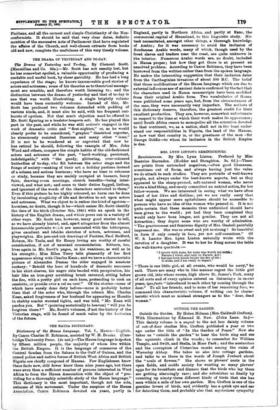THE DRAMA OP YESTERDAY AND TO-DAY.
The Drama of Yesterday and To-day, By Clement Scott. (Macmillan and Co. 86s.)—Mr. Scott has not exactly lost, but he has somewhat spoiled, a valuable opportunity of producing a readable and useful book, by sheer garrulity. He has had a long experience of the stage; he knows innumerable good stories of actors and actresses; some of his theories as to theatrical manage- ment are sensible, and therefore worth listening to ; and the distinction between the drama of yesterday and that of to-day is one that was worth illustrating. A single brightly volume would have been eminently welcome. Instead of this, Mr. Scott has produced two volumes distended with padding of various kinds, and, it must also be said, with too frequent out- bursts of egotism. Not that much objection need be offered to Mr. Scott figuring as a laudator tenvporis acti. He has played this part in the past, and while he was still actively engaged in the work of dramatic critic and "first-nighter," or, as he would clearly prefer to be considered, " graphic " theatrical reporter, he strenuously resisted Ibsenism and many other " isms." It is not to be wondered at or regretted that now he has retired he should, following the example of Mrs. John Wood and others, compare the simple habits of the old-fashioned actors and actresses of the past, "hard-working, persistent, indefatigable," with " the gaudy, glittering, over-coloured butterflies of to-day, who flit between the sober stage and the fringe of society—making of their art a holiday pastime instead of a solemn and serious business ; who have no time to rehearse or study, because they are mainly occupied at bazaars, fancy fairs, drawing-room meetings, church benefits—being inter- viewed, and what not; and come to their duties fagged, listless, and ignorant of the words of the characters entrusted to them." Even if this picture be too highly coloured, no harm can be done by inculcating simplicity of life and devotion to art upon actors and actresses. What we object to is rather the kind of egotism— harmless, no doubt, though it be—which makes Mr. Scott identify the date of his birth (October 6th, 1841) with an epoch in the history of the English drama, and which peers out in a variety of other ways. Mr. Scott has, however, many good stories to tell, as we have already hinted, and, apart altogether from the almost innumerable portraits wi.ich are associated with the letterpress, gives excellent and lifelike sketches of actors, actresses, and playwrights. His pen-and-ink drawings of Fechter, Paul Bedford, Robson, Mr. Toole, and Sir Henry Irving are worthy of careful consideration, if not of unmixed commendation. Sothern, too, lives again in Mr. Scott's pages, in his weakness, as well as in his strength ; Miss Ellen Terry tells pleasantly of her first appearance along with Charles Kean; and we have a characteristic picture of Alexandre Dumas the elder engaged in amateur cookery : " Behold the hero of hundreds of dramatic successes in his shirt sleeves, his negro skin beaded with perspiration, his hair like an iron-grey scrubbing brush reversed, sitting before the fire, with a pretty girl on each knee, pretending to cook an omelette, or preside over a vol au vent" Of the stories—some of which have surely done duty before—none is probably better than that of the actor who, through the solemn Mrs. Charles Kean, asked forgiveness of her husband for appearing as Horatio in shabby scarlet worsted tights, and was told, "Mr. Kean will pardon you. But " (pointing ecstatically to heaven) " will you be forgiven there ? " Mr. Scott's volumes, if not the history of the Victorian stage, will be found of much value by the historian of the future.


















































 Previous page
Previous page